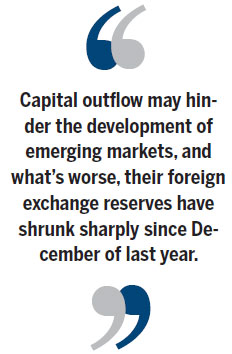China must watch out for capital outflows
Updated: 2015-05-29 08:21
By He Jun(China Daily Europe)
|
|||||||||||
Emerging markets likely to see large amounts of money leaving, given changes in global economic climate
Since last year, developed countries and emerging market economies have had to face a reversal of the economic climate that followed the worldwide financial crisis.
Especially in the wake of the United States' retreat from quantitative easing and the appreciation of the dollar, emerging market economies have been subject to serious net capital outflows - more serious, in fact, than during the crisis.
The net capital outflow in the 15 largest emerging economies amounted to $600 billion during the three quarters before the end of March, according to estimates by NN Investment Partners. The net capital outflow was only $545 billion during the three quarters before the end of March 2009, which were also the worst months of the financial crisis. This shows that the market's confidence in some of the largest developing countries is very weak.

The United States has followed a loose monetary policy for many years since the crisis, which has facilitated the large capital waves rushing into the emerging market. From July of 2009 to the end of last June, the net capital inflow added up to $2.2 trillion in these 15 emerging economies. However, the current capital outflow has reversed this trend to some extent.
This situation is playing out against the background that economic growth is slowing in emerging economies. From our point of view, the fundamental cause of capital outflow is the slowing economies in these emerging markets.
It is estimated by Capital Economics that the average GDP growth rate of the whole emerging markets will drop from 4.1 percent in January to 3.9 percent in February. It is the second time the rate has gone below 4 percent since the Argentine crisis of 2001 and 2002.
Capital outflow may hinder the development of emerging markets, and what's worse, their foreign exchange reserves have shrunk sharply since last December. In March, the overall foreign exchange reserves of emerging economies decreased by the quite large amount of $374.4 billion.
It is noteworthy that China is likely to suffer most from this capital outflow. Last year, China had a double surplus in trade and capital. The situation has not improved this year as the national and international economic and financial environments continue to be complicated.
Economic development faces more pressure, and the renminbi exchange rate has undergone obvious two-way fluctuation. Given this, the cross-border capital flow becomes more unstable in China, resulting in higher potential for capital outflows.

The figures of foreign exchange settlement and sale from China's banks also show that capital is flowing out. The deficit of foreign exchange settlement and sale was $8.2 billion in January, reaching $17.2 billion in February and $66 billion in March. On the other hand, the data of the banks' cross-border payments and receipts on behalf of their clients also show the same trend. In January, the surplus of this business was $36.7 billion, falling to $18.3 billion in February. In March, it turned into a deficit of $23.8 billion after a violent fluctuation.
Yi Gang, vice-president of China's central bank, said: "China has large-scale commodity trade and service trade, as well as numerous FDI and ODI. The cross-border flow of people, commodities, cash and investment all contribute to the capital flow." Last year, for those companies and individuals within China, earnings from foreign business were $3.3 trillion, while expenditure was $3.2 trillion. China's banks have more than $10 billion in cross-border payments or receipts on behalf of their clients, including companies and individuals.
In addition, some capital outflows are not under the supervision of the authorities. Most of that capital flows out illegally or without declaration, which means it could be considered capital flight.
According to The Wall Street Journal, Chinese investors have spent $40 billion on real estate in other countries in the past seven years. Moreover, some other data show that Chinese personal investments in foreign real estate added up to $16.5 billion last year, 46 percent higher than in 2013. It is estimated that this figure will double to $35 billion this year. Quite a few of these investments are capital flight.
Considering the changes in the global economic climate and the international financial market, emerging markets will see a large amount of capital flowing out.
China, as the largest emerging economy, should be alert for a huge capital outflow in the case of more downward economic pressure and a cooling of market confidence in the Chinese economy.
The author is a senior researcher with Anbound Consulting, a think tank for public policy. The views do not necessarily reflect those of China Daily.
(China Daily European Weekly 05/29/2015 page11)
Today's Top News
British Queen makes references to China in keynote speech
Bayern cashes in on Chinese fans' frenzy for European soccer
German rail giant mulls buying trains from China
Blair to resign as Middle East Quartet envoy
London stock exchange takes steps to include China A shares
China calls for durable settlement of Kosovo issue
China urges BRICS to unite for promoting multi-lateralism
New way to enjoy movie in Berlin
Hot Topics
Lunar probe , China growth forecasts, Emission rules get tougher, China seen through 'colored lens', International board,
Editor's Picks

|

|

|

|

|

|






